Watch CNN's comprehensive coverage of President Barack Obama's second inauguration this weekend on CNN TV and follow online at CNN.com or via CNN's apps for iPhone, iPad and Android. Then, on Monday, follow our real-time Inauguration Day live blog at cnn.com/conversation. Need other reasons to watch inauguration coverage on CNN's platforms? Click here for our list.
Washington (CNN) -- With the official business of the 57th inauguration out of the way, Washington began preparing Sunday for a day of revelry -- and for the challenges facing President Barack Obama over the next four years.
Satisfying the constitutional obligation to be sworn in on January 20, Obama and Vice President Joe Biden took quiet oaths the day before the public ceremony at the Capitol, which is expected to attract a crowd of up to 800,000 on the National Mall.
Obama will become only the 17th U.S. president to deliver a second inaugural address before leading the traditional parade up Pennsylvania Avenue to the White House.
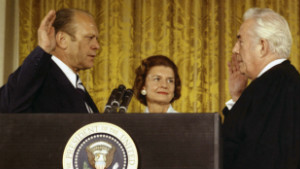 100 years of inaugurations in 2 minutes
100 years of inaugurations in 2 minutes 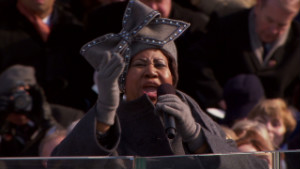 The role of music at the inauguration .cnnArticleGalleryNav{border:1px solid #000;cursor:pointer;float:left;height:25px;text-align:center;width:25px} .cnnArticleGalleryNavOn{background-color:#C03;border:1px solid #000;float:left;height:25px;text-align:center;width:20px} .cnnArticleGalleryNavDisabled{background-color:#222;border:1px solid #000;color:#666;float:left;height:25px;text-align:center;width:25px} .cnnArticleExpandableTarget{background-color:#000;display:none;position:absolute} .cnnArticlePhotoContainer{height:122px;width:214px} .cnnArticleBoxImage{cursor:pointer;height:122px;padding-top:0;width:214px} .cnnArticleGalleryCaptionControl{background-color:#000;color:#FFF} .cnnArticleGalleryCaptionControlText{cursor:pointer;float:right;font-size:10px;padding:3px 10px 3px 3px} .cnnArticleGalleryPhotoContainer cite{background:none repeat scroll 0 0 #000;bottom:48px;color:#FFF;height:auto;left:420px;opacity:.7;position:absolute;width:200px;padding:10px} .cnnArticleGalleryClose{background-color:#fff;display:block;text-align:right} .cnnArticleGalleryCloseButton{cursor:pointer} .cnnArticleGalleryNavPrevNext span{background-color:#444;color:#CCC;cursor:pointer;float:left;height:23px;text-align:center;width:26px;padding:4px 0 0} .cnnArticleGalleryNavPrevNextDisabled span{background-color:#444;color:#666;float:left;height:23px;text-align:center;width:25px;padding:4px 0 0} .cnnVerticalGalleryPhoto{padding-right:68px;width:270px;margin:0 auto} .cnnGalleryContainer{float:left;clear:left;margin:0 0 20px;padding:0 0 0 10px}
The role of music at the inauguration .cnnArticleGalleryNav{border:1px solid #000;cursor:pointer;float:left;height:25px;text-align:center;width:25px} .cnnArticleGalleryNavOn{background-color:#C03;border:1px solid #000;float:left;height:25px;text-align:center;width:20px} .cnnArticleGalleryNavDisabled{background-color:#222;border:1px solid #000;color:#666;float:left;height:25px;text-align:center;width:25px} .cnnArticleExpandableTarget{background-color:#000;display:none;position:absolute} .cnnArticlePhotoContainer{height:122px;width:214px} .cnnArticleBoxImage{cursor:pointer;height:122px;padding-top:0;width:214px} .cnnArticleGalleryCaptionControl{background-color:#000;color:#FFF} .cnnArticleGalleryCaptionControlText{cursor:pointer;float:right;font-size:10px;padding:3px 10px 3px 3px} .cnnArticleGalleryPhotoContainer cite{background:none repeat scroll 0 0 #000;bottom:48px;color:#FFF;height:auto;left:420px;opacity:.7;position:absolute;width:200px;padding:10px} .cnnArticleGalleryClose{background-color:#fff;display:block;text-align:right} .cnnArticleGalleryCloseButton{cursor:pointer} .cnnArticleGalleryNavPrevNext span{background-color:#444;color:#CCC;cursor:pointer;float:left;height:23px;text-align:center;width:26px;padding:4px 0 0} .cnnArticleGalleryNavPrevNextDisabled span{background-color:#444;color:#666;float:left;height:23px;text-align:center;width:25px;padding:4px 0 0} .cnnVerticalGalleryPhoto{padding-right:68px;width:270px;margin:0 auto} .cnnGalleryContainer{float:left;clear:left;margin:0 0 20px;padding:0 0 0 10px} 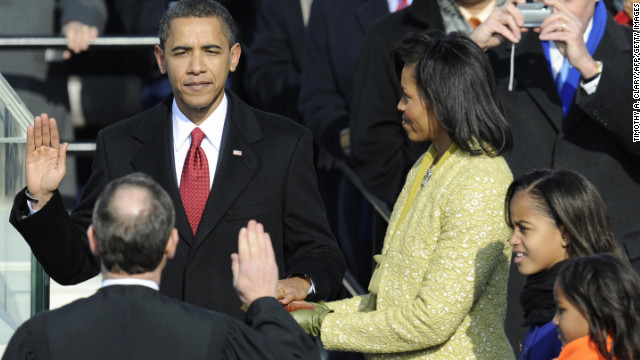 Barack Obama is sworn in as the first African-American president of the United States on January 20, 2009. George W. Bush stands next to his wife, Laura, and his two daughters at his second inauguration on January 20, 2005. George W. Bush is sworn in for his first term on January 20, 2001. Bill Clinton is sworn in for the second time on January 20, 1997. Bill Clinton takes his first inaugural oath on January 20, 1993. Chief Justice William Rehnquist administers the oath of office to President George H. W. Bush on January 20, 1989. Ronald Reagan is sworn in on January 21, 1985, at the U.S. Capitol for his second term by Supreme Court Chief Justice Warren Burger. Ronald Reagan is sworn in as 40th president of the United States on January 20, 1981. Jimmy Carter is sworn in on January 20, 1977. Supreme Court Chief Justice Warren Burger swears in Gerald Ford on August 9, 1974, after the resignation of President Richard Nixon. Chief Justice Warren E. Burger administers the oath of office to Richard M. Nixon for his second term at the U.S. Capitol, January 20, 1973. Richard Nixon takes the oath of office as he is sworn in as the 37th president of the United States on January 20, 1969. Lyndon B. Johnson, left, is sworn in for his second term by Chief Justice Earl Warren on January 20, 1965. Lyndon B. Johnson takes the oath of office on November 22, 1963, after the assassination of President John F. Kennedy. Kennedy's widow, Jacqueline, stands at Johnson's side. U.S. District Judge Sarah T. Hughes swore in Johnson on Air Force One. John F. Kennedy is sworn in on January 20, 1961. A crowd gathers outside the U.S. Capitol for Dwight D. Eisenhower's second inauguration on January 20, 1957. Dwight D. Eisenhower takes the oath of office on January 20, 1953. President Harry S. Truman waves to the crowd from a car during a parade after his inauguration speech on January 20, 1949. Chief Justice Harlan F. Stone administers the oath of office to Harry S. Truman in the Cabinet Room of the White House on April 12, 1945, after death of President Franklin D. Roosevelt. Franklin D. Roosevelt delivers his fourth and final inauguration speech on January 20, 1945. He was the last president allowed to hold more than two terms. Franklin D. Roosevelt gives his third inaugural address on January 20, 1941. Chief Justice Charles Evans Hughes Sr. administers the oath of office to Franklin D. Roosevelt for his second term on January 20, 1937. This marked the first January event; before this, inaugurations were traditionally held in March. Franklin Delano Roosevelt is sworn in for his first term on March 4, 1933. Herbert Hoover's inauguration is held on March 4, 1929. Calvin Coolidge is sworn in for his second term on March 4, 1925. Calvin Coolidge is given the oath of office by his father, Col. John Coolidge, in Plymouth, Vermont, on August 3, 1923, after the death of President Warren G. Harding. Warren G. Harding is sworn in on March 4, 1921. Soldiers pass the viewing stand during the inaugural ceremony for Woodrow Wilson's second term on March 4, 1917. Woodrow Wilson's first inauguration was held on March 4, 1913. William Howard Taft was inaugurated on March 4, 1909. Theodore Roosevelt takes the oath of office for his second term on March 4, 1905. Theodore Roosevelt takes the oath of office in Buffalo, New York, on September 14, 1901, after the assassination of President William McKinley. Chief Justice Melville Fuller administers the oath of office to President William McKinley for his second term on March 4, 1901. William McKinley takes his first the oath of office on March 4, 1897. Grover Cleveland's second inauguration is held on March 4, 1893. Chief Justice Melville W. Fuller administers the oath of office to Benjamin Harrison on the east portico of the U.S. Capitol on March 4, 1889. Harrison served between Cleveland's two terms. Grover Cleveland delivers his first inaugural address to the crowd on the east portico of U.S. Capitol on March 4, 1885. New York Supreme Court Justice John R. Brady administers the oath of office to Vice President Chester A. Arthur in a private ceremony in Arthur's residence in New York on September 20, 1881, after the assassination of President James A. Garfield. Chief Justice Morrison R. Waite administers the oath of office to James A. Garfield on the east portico of the U.S. Capitol on March 4, 1881. Rutherford B. Hayes takes the oath of office from Chief Justice Morrison R. Waite on the east portico of the U.S. Capitol on March 5, 1877. Chief Justice Salmon P. Chase administers the oath of office for Ulysses S. Grant's second term on March 4, 1873. Ulysses S. Grant takes his first oath of office, administered by Chief Justice Salmon P. Chase, on the east portico of the U.S. Capitol in Washington on March 4, 1869. Andrew Johnson takes the oath of office from Chief Justice Salmon P. Chase in Washington on April 15, 1865, after the assassination of Abraham Lincoln. Abraham Lincoln take the oath of office for the second time on March 4, 1865. The first inauguration of Abraham Lincoln takes place on March 4, 1861. James Buchanan's inauguration is held at the U.S. Capitol on March 4, 1857. Chief Justice Roger B. Taney administers the oath of office to Franklin Pierce on the east portico of the U.S. Capitol on March 4, 1853. Millard Fillmore was sworn in on July 10, 1850, after the death of President Zachary Taylor. Zachary Taylor is sworn in on March 5, 1849. James K. Polk was sworn in on March 4, 1845. John Tyler took the oath of office on April 6, 1841, after the death of William Henry Harrison, who died after just 32 days in office. William Henry Harrison took the oath of office on March 4, 1841. Martin Van Buren was inaugurated on March 4, 1837. Andrew Jackson was sworn in for his second term on March 4, 1833. Andrew Jackson was inaugurated for his first term on March 4, 1829, on the east portico of the U.S. Capitol. John Quincy Adams was sworn into office on March 4, 1825. James Monroe was sworn in for his second term on March 4, 1821. James Monroe was sworn in for his first term on March 4, 1817. James Madison was inaugurated for his second term on March 4, 1813. James Madison was sworn in for his first term on March 4, 1809. Thomas Jefferson was sworn in for his second term on March 4, 1805. Thomas Jefferson was inaugurated for his first term on March 4, 1801. John Adams was inaugurated on March 4, 1797. George Washington stands outside his carriage at his second inauguration on March 4, 1793. Sword by his side, George Washington takes his inaugural oath as the first president of the United States on April 30, 1789. Presidential inaugurations and oaths Presidential inaugurations and oaths Presidential inaugurations and oaths Presidential inaugurations and oaths Presidential inaugurations and oaths Presidential inaugurations and oaths Presidential inaugurations and oaths Presidential inaugurations and oaths Presidential inaugurations and oaths Presidential inaugurations and oaths Presidential inaugurations and oaths Presidential inaugurations and oaths Presidential inaugurations and oaths Presidential inaugurations and oaths Presidential inaugurations and oaths Presidential inaugurations and oaths Presidential inaugurations and oaths Presidential inaugurations and oaths Presidential inaugurations and oaths Presidential inaugurations and oaths Presidential inaugurations and oaths Presidential inaugurations and oaths Presidential inaugurations and oaths Presidential inaugurations and oaths Presidential inaugurations and oaths Presidential inaugurations and oaths Presidential inaugurations and oaths Presidential inaugurations and oaths Presidential inaugurations and oaths Presidential inaugurations and oaths Presidential inaugurations and oaths Presidential inaugurations and oaths Presidential inaugurations and oaths Presidential inaugurations and oaths Presidential inaugurations and oaths Presidential inaugurations and oaths Presidential inaugurations and oaths Presidential inaugurations and oaths Presidential inaugurations and oaths Presidential inaugurations and oaths Presidential inaugurations and oaths Presidential inaugurations and oaths Presidential inaugurations and oaths Presidential inaugurations and oaths Presidential inaugurations and oaths Presidential inaugurations and oaths Presidential inaugurations and oaths Presidential inaugurations and oaths Presidential inaugurations and oaths Presidential inaugurations and oaths Presidential inaugurations and oaths Presidential inaugurations and oaths Presidential inaugurations and oaths Presidential inaugurations and oaths Presidential inaugurations and oaths Presidential inaugurations and oaths Presidential inaugurations and oaths Presidential inaugurations and oaths Presidential inaugurations and oaths Presidential inaugurations and oaths Presidential inaugurations and oaths Presidential inaugurations and oaths Presidential inaugurations and oaths Presidential inaugurations and oaths Presidential inaugurations and oaths HIDE CAPTION << <
Barack Obama is sworn in as the first African-American president of the United States on January 20, 2009. George W. Bush stands next to his wife, Laura, and his two daughters at his second inauguration on January 20, 2005. George W. Bush is sworn in for his first term on January 20, 2001. Bill Clinton is sworn in for the second time on January 20, 1997. Bill Clinton takes his first inaugural oath on January 20, 1993. Chief Justice William Rehnquist administers the oath of office to President George H. W. Bush on January 20, 1989. Ronald Reagan is sworn in on January 21, 1985, at the U.S. Capitol for his second term by Supreme Court Chief Justice Warren Burger. Ronald Reagan is sworn in as 40th president of the United States on January 20, 1981. Jimmy Carter is sworn in on January 20, 1977. Supreme Court Chief Justice Warren Burger swears in Gerald Ford on August 9, 1974, after the resignation of President Richard Nixon. Chief Justice Warren E. Burger administers the oath of office to Richard M. Nixon for his second term at the U.S. Capitol, January 20, 1973. Richard Nixon takes the oath of office as he is sworn in as the 37th president of the United States on January 20, 1969. Lyndon B. Johnson, left, is sworn in for his second term by Chief Justice Earl Warren on January 20, 1965. Lyndon B. Johnson takes the oath of office on November 22, 1963, after the assassination of President John F. Kennedy. Kennedy's widow, Jacqueline, stands at Johnson's side. U.S. District Judge Sarah T. Hughes swore in Johnson on Air Force One. John F. Kennedy is sworn in on January 20, 1961. A crowd gathers outside the U.S. Capitol for Dwight D. Eisenhower's second inauguration on January 20, 1957. Dwight D. Eisenhower takes the oath of office on January 20, 1953. President Harry S. Truman waves to the crowd from a car during a parade after his inauguration speech on January 20, 1949. Chief Justice Harlan F. Stone administers the oath of office to Harry S. Truman in the Cabinet Room of the White House on April 12, 1945, after death of President Franklin D. Roosevelt. Franklin D. Roosevelt delivers his fourth and final inauguration speech on January 20, 1945. He was the last president allowed to hold more than two terms. Franklin D. Roosevelt gives his third inaugural address on January 20, 1941. Chief Justice Charles Evans Hughes Sr. administers the oath of office to Franklin D. Roosevelt for his second term on January 20, 1937. This marked the first January event; before this, inaugurations were traditionally held in March. Franklin Delano Roosevelt is sworn in for his first term on March 4, 1933. Herbert Hoover's inauguration is held on March 4, 1929. Calvin Coolidge is sworn in for his second term on March 4, 1925. Calvin Coolidge is given the oath of office by his father, Col. John Coolidge, in Plymouth, Vermont, on August 3, 1923, after the death of President Warren G. Harding. Warren G. Harding is sworn in on March 4, 1921. Soldiers pass the viewing stand during the inaugural ceremony for Woodrow Wilson's second term on March 4, 1917. Woodrow Wilson's first inauguration was held on March 4, 1913. William Howard Taft was inaugurated on March 4, 1909. Theodore Roosevelt takes the oath of office for his second term on March 4, 1905. Theodore Roosevelt takes the oath of office in Buffalo, New York, on September 14, 1901, after the assassination of President William McKinley. Chief Justice Melville Fuller administers the oath of office to President William McKinley for his second term on March 4, 1901. William McKinley takes his first the oath of office on March 4, 1897. Grover Cleveland's second inauguration is held on March 4, 1893. Chief Justice Melville W. Fuller administers the oath of office to Benjamin Harrison on the east portico of the U.S. Capitol on March 4, 1889. Harrison served between Cleveland's two terms. Grover Cleveland delivers his first inaugural address to the crowd on the east portico of U.S. Capitol on March 4, 1885. New York Supreme Court Justice John R. Brady administers the oath of office to Vice President Chester A. Arthur in a private ceremony in Arthur's residence in New York on September 20, 1881, after the assassination of President James A. Garfield. Chief Justice Morrison R. Waite administers the oath of office to James A. Garfield on the east portico of the U.S. Capitol on March 4, 1881. Rutherford B. Hayes takes the oath of office from Chief Justice Morrison R. Waite on the east portico of the U.S. Capitol on March 5, 1877. Chief Justice Salmon P. Chase administers the oath of office for Ulysses S. Grant's second term on March 4, 1873. Ulysses S. Grant takes his first oath of office, administered by Chief Justice Salmon P. Chase, on the east portico of the U.S. Capitol in Washington on March 4, 1869. Andrew Johnson takes the oath of office from Chief Justice Salmon P. Chase in Washington on April 15, 1865, after the assassination of Abraham Lincoln. Abraham Lincoln take the oath of office for the second time on March 4, 1865. The first inauguration of Abraham Lincoln takes place on March 4, 1861. James Buchanan's inauguration is held at the U.S. Capitol on March 4, 1857. Chief Justice Roger B. Taney administers the oath of office to Franklin Pierce on the east portico of the U.S. Capitol on March 4, 1853. Millard Fillmore was sworn in on July 10, 1850, after the death of President Zachary Taylor. Zachary Taylor is sworn in on March 5, 1849. James K. Polk was sworn in on March 4, 1845. John Tyler took the oath of office on April 6, 1841, after the death of William Henry Harrison, who died after just 32 days in office. William Henry Harrison took the oath of office on March 4, 1841. Martin Van Buren was inaugurated on March 4, 1837. Andrew Jackson was sworn in for his second term on March 4, 1833. Andrew Jackson was inaugurated for his first term on March 4, 1829, on the east portico of the U.S. Capitol. John Quincy Adams was sworn into office on March 4, 1825. James Monroe was sworn in for his second term on March 4, 1821. James Monroe was sworn in for his first term on March 4, 1817. James Madison was inaugurated for his second term on March 4, 1813. James Madison was sworn in for his first term on March 4, 1809. Thomas Jefferson was sworn in for his second term on March 4, 1805. Thomas Jefferson was inaugurated for his first term on March 4, 1801. John Adams was inaugurated on March 4, 1797. George Washington stands outside his carriage at his second inauguration on March 4, 1793. Sword by his side, George Washington takes his inaugural oath as the first president of the United States on April 30, 1789. Presidential inaugurations and oaths Presidential inaugurations and oaths Presidential inaugurations and oaths Presidential inaugurations and oaths Presidential inaugurations and oaths Presidential inaugurations and oaths Presidential inaugurations and oaths Presidential inaugurations and oaths Presidential inaugurations and oaths Presidential inaugurations and oaths Presidential inaugurations and oaths Presidential inaugurations and oaths Presidential inaugurations and oaths Presidential inaugurations and oaths Presidential inaugurations and oaths Presidential inaugurations and oaths Presidential inaugurations and oaths Presidential inaugurations and oaths Presidential inaugurations and oaths Presidential inaugurations and oaths Presidential inaugurations and oaths Presidential inaugurations and oaths Presidential inaugurations and oaths Presidential inaugurations and oaths Presidential inaugurations and oaths Presidential inaugurations and oaths Presidential inaugurations and oaths Presidential inaugurations and oaths Presidential inaugurations and oaths Presidential inaugurations and oaths Presidential inaugurations and oaths Presidential inaugurations and oaths Presidential inaugurations and oaths Presidential inaugurations and oaths Presidential inaugurations and oaths Presidential inaugurations and oaths Presidential inaugurations and oaths Presidential inaugurations and oaths Presidential inaugurations and oaths Presidential inaugurations and oaths Presidential inaugurations and oaths Presidential inaugurations and oaths Presidential inaugurations and oaths Presidential inaugurations and oaths Presidential inaugurations and oaths Presidential inaugurations and oaths Presidential inaugurations and oaths Presidential inaugurations and oaths Presidential inaugurations and oaths Presidential inaugurations and oaths Presidential inaugurations and oaths Presidential inaugurations and oaths Presidential inaugurations and oaths Presidential inaugurations and oaths Presidential inaugurations and oaths Presidential inaugurations and oaths Presidential inaugurations and oaths Presidential inaugurations and oaths Presidential inaugurations and oaths Presidential inaugurations and oaths Presidential inaugurations and oaths Presidential inaugurations and oaths Presidential inaugurations and oaths Presidential inaugurations and oaths Presidential inaugurations and oaths HIDE CAPTION << <  1
1  2
2  3
3  4
4  5
5  6
6  7
7  8
8  9
9  10
10  11
11  12
12  13
13  14
14  15
15  16
16  17
17  18
18  19
19  20
20  21
21  22
22  23
23  24
24  25
25  26
26  27
27  28
28  29
29  30
30  31
31  32
32  33
33  34
34  35
35  36
36  37
37  38
38  39
39  40
40  41
41  42
42  43
43  44
44  45
45  46
46  47
47  48
48  49
49  50
50  51
51  52
52  53
53  54
54  55
55  56
56  57
57  58
58  59
59  60
60  61
61  62
62  63
63  64
64  65 > >>
65 > >> 
Monday's events will be smaller than Obama's first inauguration in 2009, when nearly two million people witnessed the swearing-in of the country's first African-American president.
Less intensity this time reflects the reality of second-term presidencies, when the novelty and expectations of a new leader have been replaced with the familiarity and experiences of the first four years.
For Obama, that difference is even sharper.
His historic ascent to the White House in 2008 came with soaring public hopes and expectations for a new kind of governance that would close the vast partisan gulf developed in recent decades.
Obama to acknowledge divided Washington in inaugural address
However, a list of challenges that included an inherited economic recession and repeated battles with congressional Republicans over budgets and spending only hardened the opposing positions in Washington.
Obama's signature achievements, including major reforms of the health care industry and Wall Street, became symbols of political division, with opponents constantly accusing him of hindering needed economic recovery.
A second-term Obama has vowed to press for an overhaul of the nation's immigration policies and new ways to boost the sputtering economy -- proposals that are bound to spark battles with his Republican rivals -- and oversee the implementation of Obamacare.
And the shootings at a Connecticut elementary school last month put the divisive issue of gun control on his immediate agenda.
CNN polling released Sunday showed a majority of Americans -- 54% -- believe Obama will be an outstanding or above average president in his second term, while 43% said he'd be poor or below average.
And while overall, seven in 10 Americans hope the president's policies succeed, only four in 10 Republicans feel that way, with 52% hoping that Obama will fail.
Obama's senior adviser, David Plouffe, said on Sunday that "the challenges and opportunities are enormous" in the president's second term, and that those challenges would be confronted as soon as the inaugural celebrations play out.
The tone of Obama's inaugural address on Monday will be "hopeful," Plouffe told CNN on Sunday, explaining that Obama would "remind the country that our founding principles and values still can guide us in a changing and modern world."
 100 years of inaugurations in 2 minutes
100 years of inaugurations in 2 minutes 13 reasons to follow the inauguration on CNN platforms
"He's going to talk about the fact that our political system doesn't require us to resolve all of our disputes or settle all of our differences but it doesn't compel us to act where there shouldn't and is common ground," Plouffe added. "He's going to make that point very clearly."
Plouffe underscored that Obama's State of the Union address, to take place February 12, will present a more specific "blueprint" of the next four years.
Obama's swearing-in on Sunday took place in the ornate Blue Room, an oval-shaped reception space in the president's official residence, where he was joined by his wife, Michelle, and his two daughters.
Obama placed his left hand on a Bible held by Mrs. Obama that was from her family. He then raised his right hand.
Chief Justice John Roberts administered the oath - his third time to hold that honor. After Roberts flubbed the order of words during the public ceremony in 2009, a do-over took place in the White House Map Room the next day to erase any question that Obama was officially the president.
Obamas, Bidens participate in National Day of Service
Roberts didn't have any trouble with the oath this time around. He read from a white note card. Slash marks where Roberts paused to have Obama repeat the words were clearly visible.
The event took less than a minute and Obama didn't make any formal remarks or statements.
He did take a moment to hug his wife and daughters, exclaiming: "I did it!"
Justice Sonia Sotomayor performed the honors for Biden at his home at the Naval Observatory in Washington, where the vice president's extended family and a few Cabinet officials gathered to watch the ceremony.
Katy Perry brings 'Fireworks' to inauguration kids' concert
Both Obama and Biden went to Arlington National Cemetery after Biden's swearing-in for a traditional wreath laying.
The president and his family also attended services celebrating the Rev. Martin Luther King Jr. at Metropolitan African Methodist Episcopal Church, one of the most historic churches in Washington.
Inauguration activities kicked off on Saturday with Obama and Mrs. Obama and Biden and his wife, Jill, leading volunteers across the country in National Day of Service Activities.
Later Saturday, singer Katy Perry headlined a concert for children of military families and Washington schoolchildren, hosted by Michelle Obama and Jill Biden. Singer Usher and the cast of the TV show "Glee" were among others who performed.
Sunday evening, the Obamas will watch Latino acts at "In Performance at the Kennedy Center," which is followed by the Let Freedom Ring concert. The Red, White and Blue Inaugural Ball and Hip-Hop Inaugural Ball are also scheduled in the capital.
Viewer's guide to the inauguration
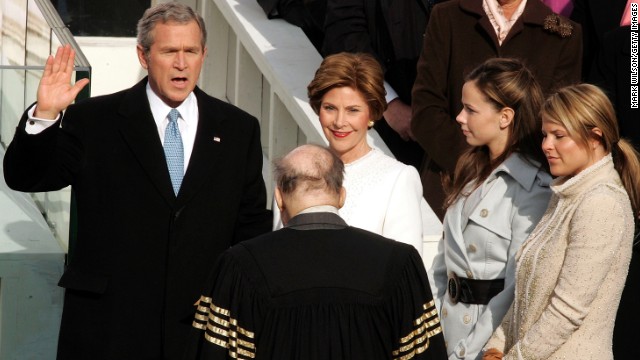 George W. Bush stands next to his wife, Laura, and his two daughters at his second inauguration on January 20, 2005.
George W. Bush stands next to his wife, Laura, and his two daughters at his second inauguration on January 20, 2005. 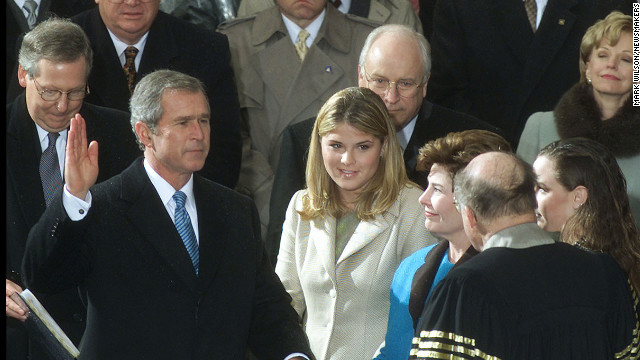 George W. Bush is sworn in for his first term on January 20, 2001.
George W. Bush is sworn in for his first term on January 20, 2001. 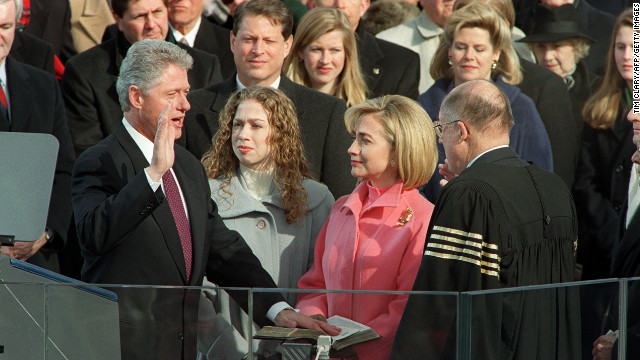 Bill Clinton is sworn in for the second time on January 20, 1997.
Bill Clinton is sworn in for the second time on January 20, 1997. 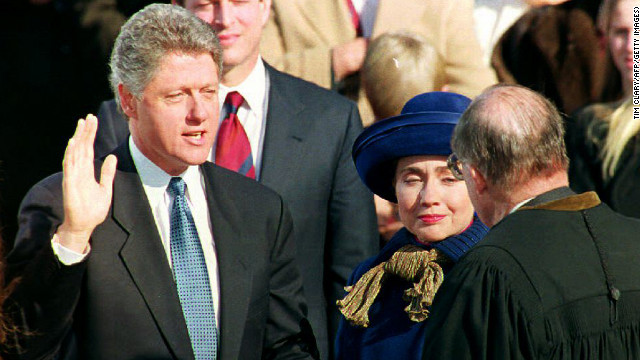 Bill Clinton takes his first inaugural oath on January 20, 1993.
Bill Clinton takes his first inaugural oath on January 20, 1993. 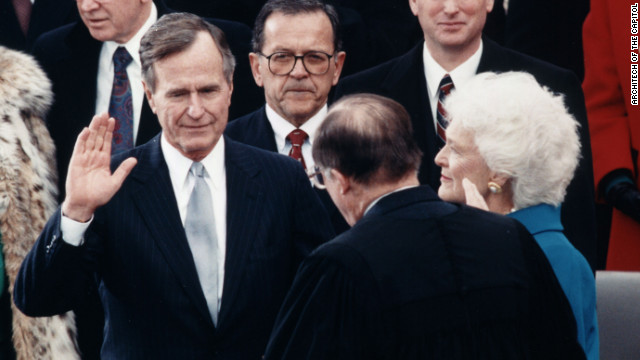 Chief Justice William Rehnquist administers the oath of office to President George H. W. Bush on January 20, 1989.
Chief Justice William Rehnquist administers the oath of office to President George H. W. Bush on January 20, 1989. 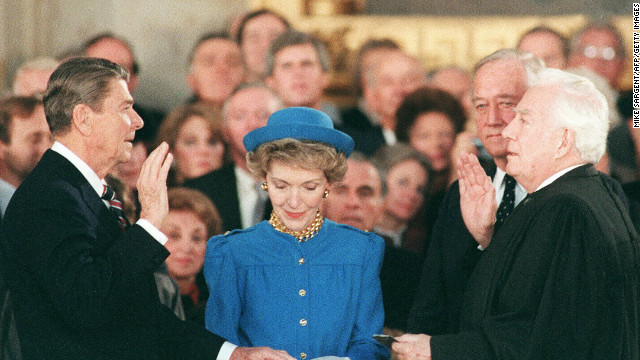 Ronald Reagan is sworn in on January 21, 1985, at the U.S. Capitol for his second term by Supreme Court Chief Justice Warren Burger.
Ronald Reagan is sworn in on January 21, 1985, at the U.S. Capitol for his second term by Supreme Court Chief Justice Warren Burger. 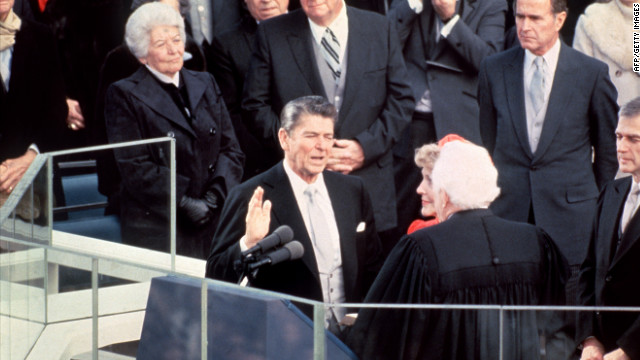 Ronald Reagan is sworn in as 40th president of the United States on January 20, 1981.
Ronald Reagan is sworn in as 40th president of the United States on January 20, 1981. 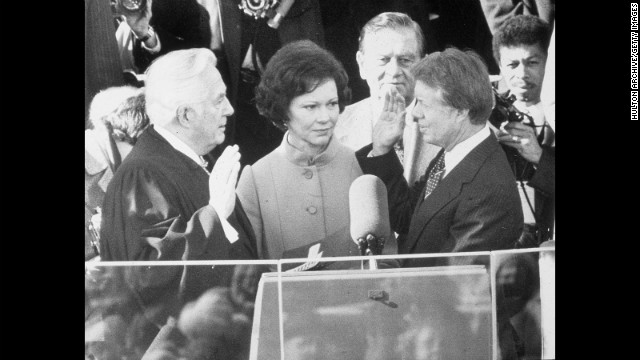 Jimmy Carter is sworn in on January 20, 1977.
Jimmy Carter is sworn in on January 20, 1977. 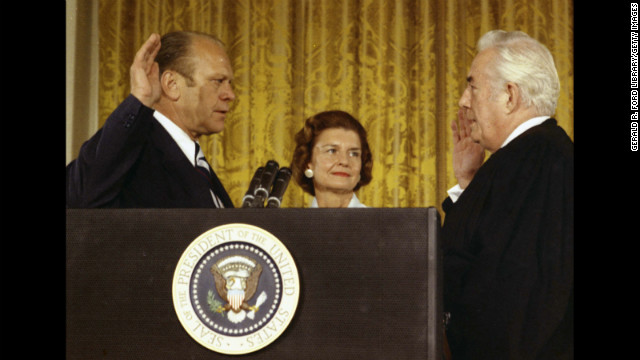 Supreme Court Chief Justice Warren Burger swears in Gerald Ford on August 9, 1974, after the resignation of President Richard Nixon.
Supreme Court Chief Justice Warren Burger swears in Gerald Ford on August 9, 1974, after the resignation of President Richard Nixon. 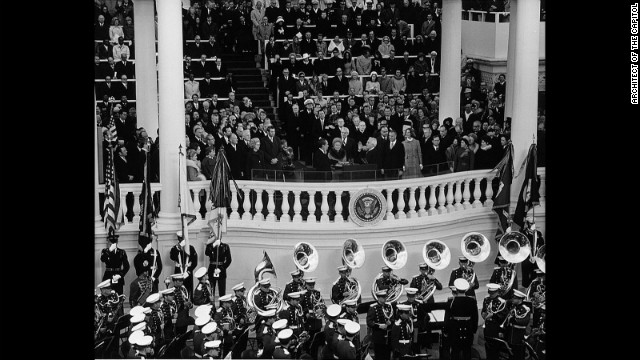 Chief Justice Warren E. Burger administers the oath of office to Richard M. Nixon for his second term at the U.S. Capitol, January 20, 1973.
Chief Justice Warren E. Burger administers the oath of office to Richard M. Nixon for his second term at the U.S. Capitol, January 20, 1973. 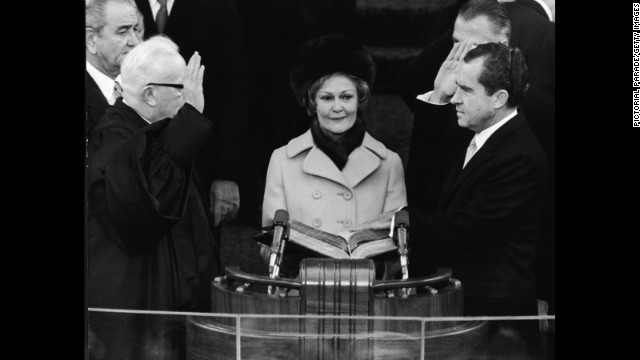 Richard Nixon takes the oath of office as he is sworn in as the 37th president of the United States on January 20, 1969.
Richard Nixon takes the oath of office as he is sworn in as the 37th president of the United States on January 20, 1969. 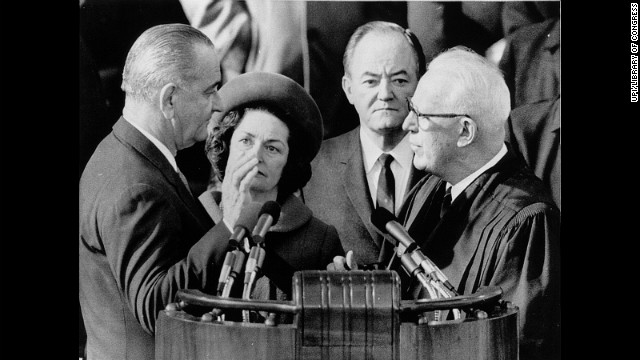 Lyndon B. Johnson, left, is sworn in for his second term by Chief Justice Earl Warren on January 20, 1965.
Lyndon B. Johnson, left, is sworn in for his second term by Chief Justice Earl Warren on January 20, 1965. 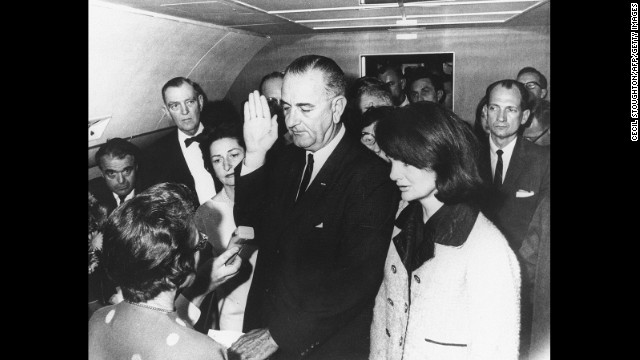 Lyndon B. Johnson takes the oath of office on November 22, 1963, after the assassination of President John F. Kennedy. Kennedy's widow, Jacqueline, stands at Johnson's side. U.S. District Judge Sarah T. Hughes swore in Johnson on Air Force One.
Lyndon B. Johnson takes the oath of office on November 22, 1963, after the assassination of President John F. Kennedy. Kennedy's widow, Jacqueline, stands at Johnson's side. U.S. District Judge Sarah T. Hughes swore in Johnson on Air Force One. 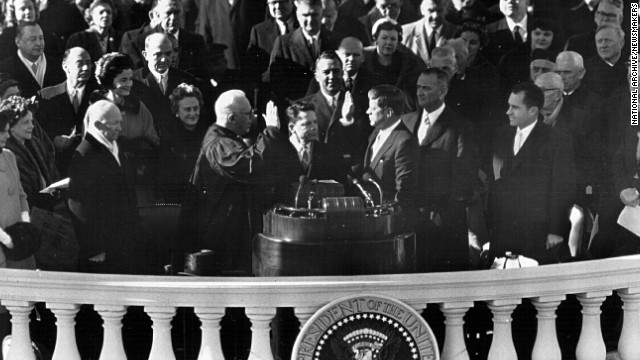 John F. Kennedy is sworn in on January 20, 1961.
John F. Kennedy is sworn in on January 20, 1961. 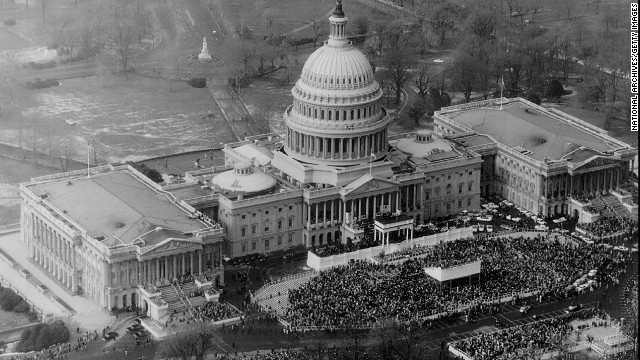 A crowd gathers outside the U.S. Capitol for Dwight D. Eisenhower's second inauguration on January 20, 1957.
A crowd gathers outside the U.S. Capitol for Dwight D. Eisenhower's second inauguration on January 20, 1957. 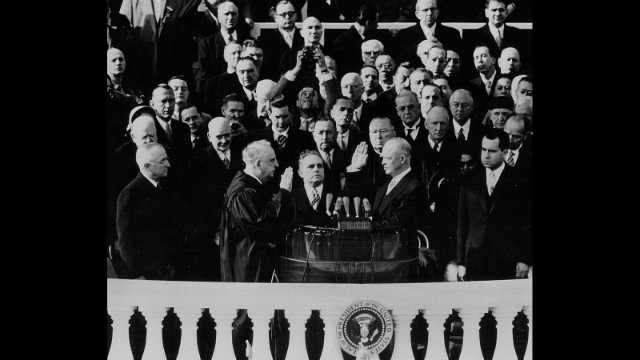 Dwight D. Eisenhower takes the oath of office on January 20, 1953.
Dwight D. Eisenhower takes the oath of office on January 20, 1953. 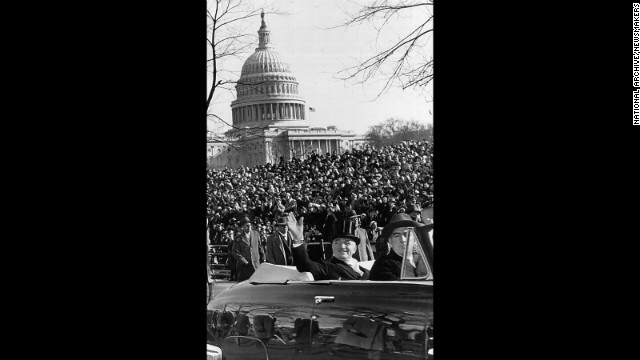 President Harry S. Truman waves to the crowd from a car during a parade after his inauguration speech on January 20, 1949.
President Harry S. Truman waves to the crowd from a car during a parade after his inauguration speech on January 20, 1949. 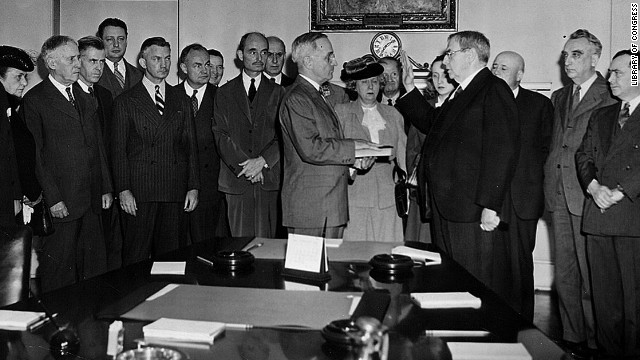 Chief Justice Harlan F. Stone administers the oath of office to Harry S. Truman in the Cabinet Room of the White House on April 12, 1945, after death of President Franklin D. Roosevelt.
Chief Justice Harlan F. Stone administers the oath of office to Harry S. Truman in the Cabinet Room of the White House on April 12, 1945, after death of President Franklin D. Roosevelt. 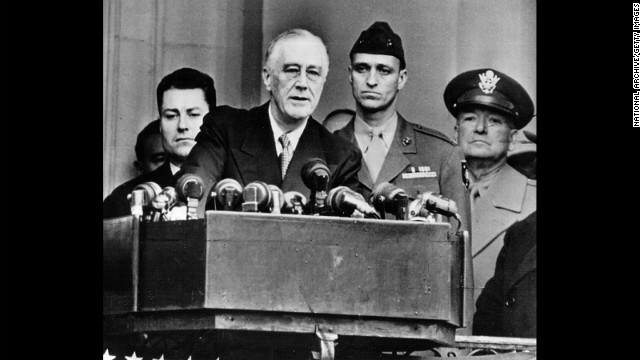 Franklin D. Roosevelt delivers his fourth and final inauguration speech on January 20, 1945. He was the last president allowed to hold more than two terms.
Franklin D. Roosevelt delivers his fourth and final inauguration speech on January 20, 1945. He was the last president allowed to hold more than two terms. 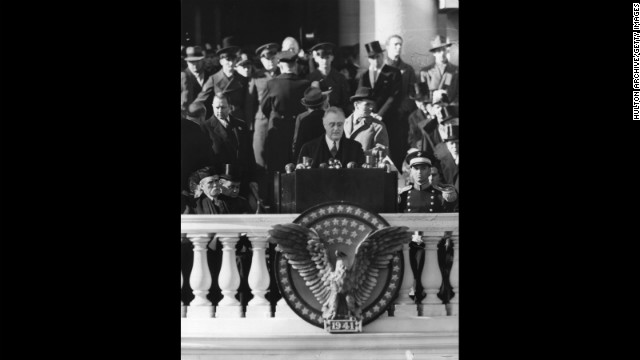 Franklin D. Roosevelt gives his third inaugural address on January 20, 1941.
Franklin D. Roosevelt gives his third inaugural address on January 20, 1941. 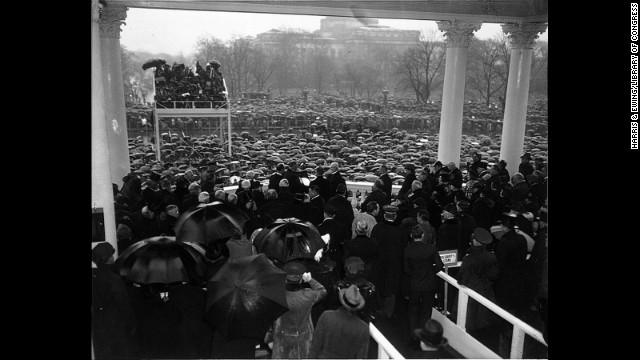 Chief Justice Charles Evans Hughes Sr. administers the oath of office to Franklin D. Roosevelt for his second term on January 20, 1937. This marked the first January event; before this, inaugurations were traditionally held in March.
Chief Justice Charles Evans Hughes Sr. administers the oath of office to Franklin D. Roosevelt for his second term on January 20, 1937. This marked the first January event; before this, inaugurations were traditionally held in March. 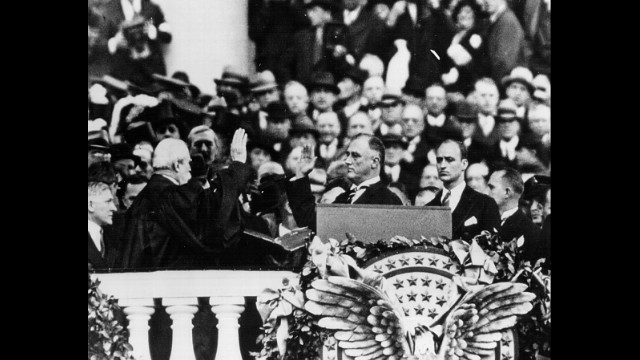 Franklin Delano Roosevelt is sworn in for his first term on March 4, 1933.
Franklin Delano Roosevelt is sworn in for his first term on March 4, 1933. 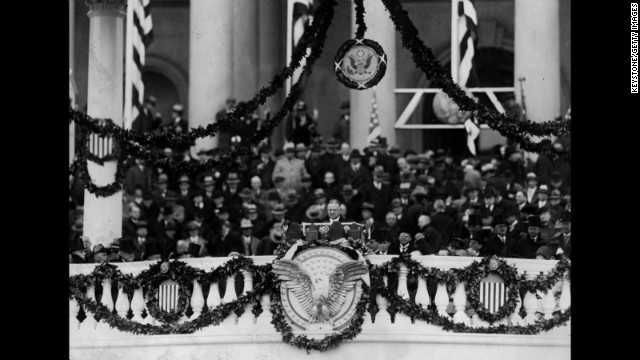 Herbert Hoover's inauguration is held on March 4, 1929.
Herbert Hoover's inauguration is held on March 4, 1929. 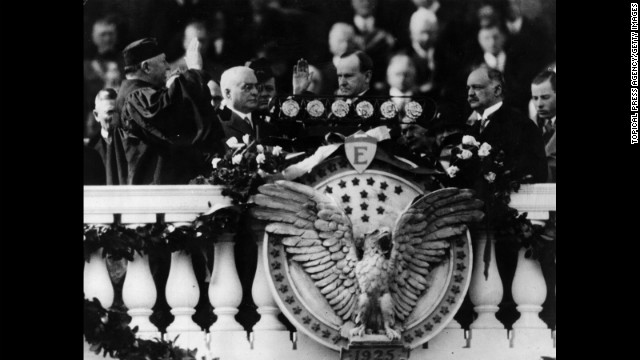 Calvin Coolidge is sworn in for his second term on March 4, 1925.
Calvin Coolidge is sworn in for his second term on March 4, 1925. 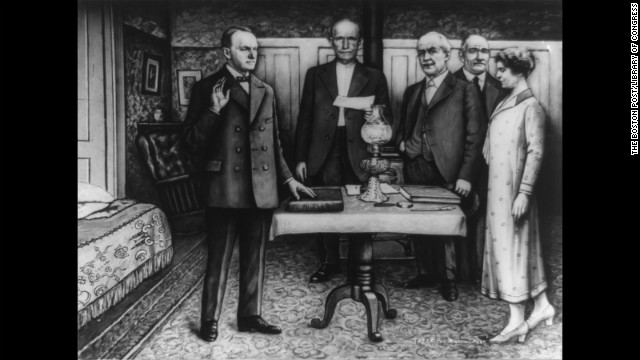 Calvin Coolidge is given the oath of office by his father, Col. John Coolidge, in Plymouth, Vermont, on August 3, 1923, after the death of President Warren G. Harding.
Calvin Coolidge is given the oath of office by his father, Col. John Coolidge, in Plymouth, Vermont, on August 3, 1923, after the death of President Warren G. Harding. 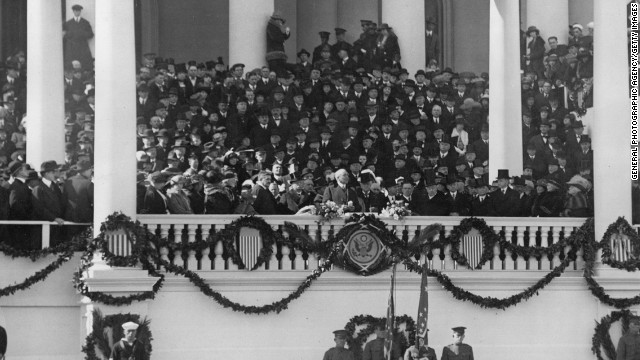 Warren G. Harding is sworn in on March 4, 1921.
Warren G. Harding is sworn in on March 4, 1921. 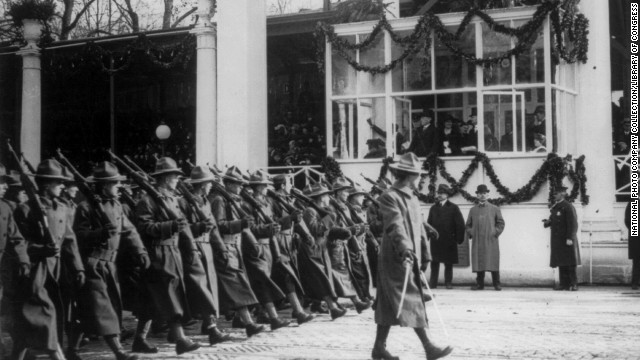 Soldiers pass the viewing stand during the inaugural ceremony for Woodrow Wilson's second term on March 4, 1917.
Soldiers pass the viewing stand during the inaugural ceremony for Woodrow Wilson's second term on March 4, 1917. 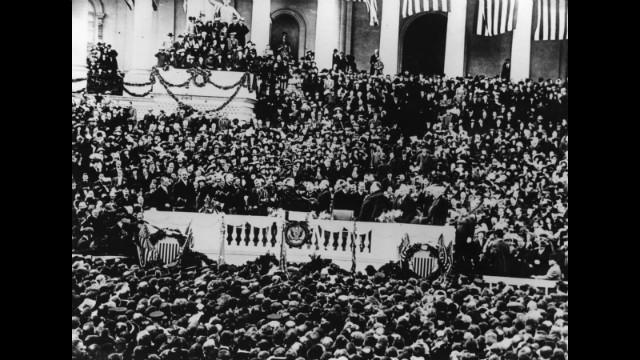 Woodrow Wilson's first inauguration was held on March 4, 1913.
Woodrow Wilson's first inauguration was held on March 4, 1913. 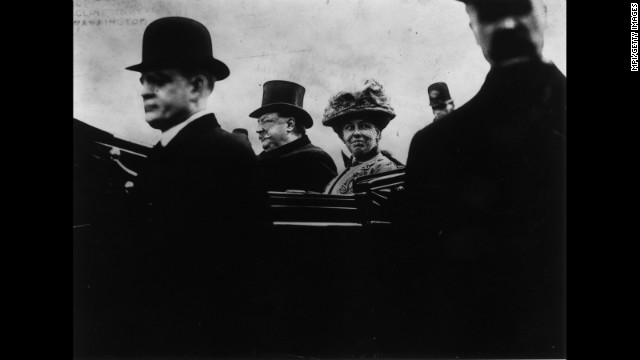 William Howard Taft was inaugurated on March 4, 1909.
William Howard Taft was inaugurated on March 4, 1909. 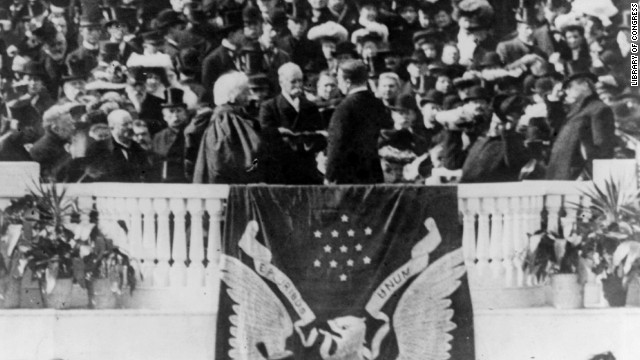 Theodore Roosevelt takes the oath of office for his second term on March 4, 1905.
Theodore Roosevelt takes the oath of office for his second term on March 4, 1905. 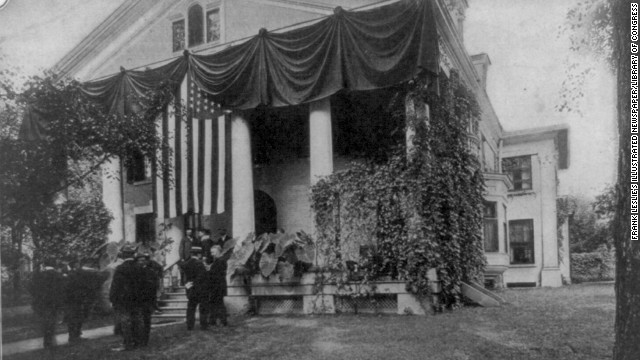 Theodore Roosevelt takes the oath of office in Buffalo, New York, on September 14, 1901, after the assassination of President William McKinley.
Theodore Roosevelt takes the oath of office in Buffalo, New York, on September 14, 1901, after the assassination of President William McKinley. 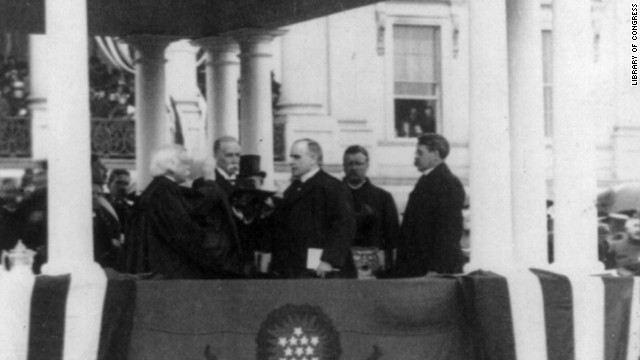 Chief Justice Melville Fuller administers the oath of office to President William McKinley for his second term on March 4, 1901.
Chief Justice Melville Fuller administers the oath of office to President William McKinley for his second term on March 4, 1901. 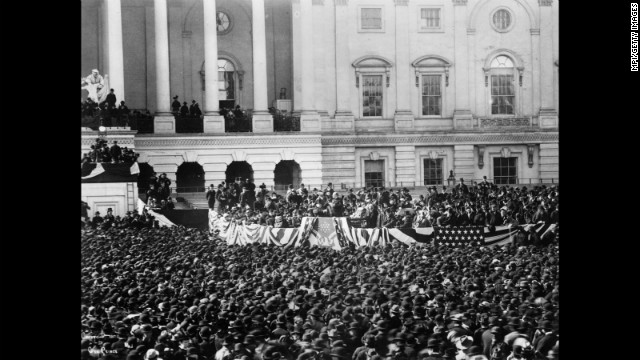 William McKinley takes his first the oath of office on March 4, 1897.
William McKinley takes his first the oath of office on March 4, 1897. 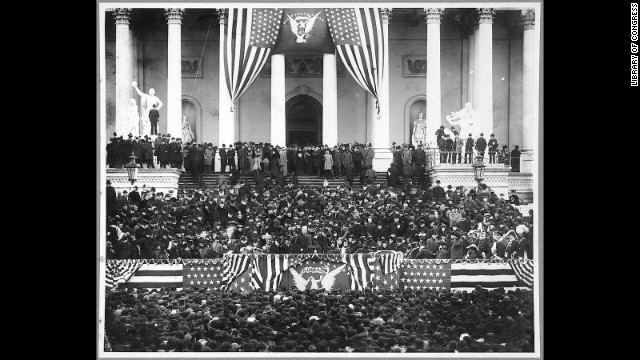 Grover Cleveland's second inauguration is held on March 4, 1893.
Grover Cleveland's second inauguration is held on March 4, 1893. 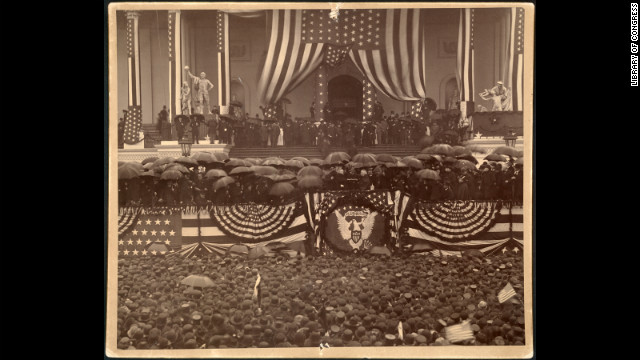 Chief Justice Melville W. Fuller administers the oath of office to Benjamin Harrison on the east portico of the U.S. Capitol on March 4, 1889. Harrison served between Cleveland's two terms.
Chief Justice Melville W. Fuller administers the oath of office to Benjamin Harrison on the east portico of the U.S. Capitol on March 4, 1889. Harrison served between Cleveland's two terms. 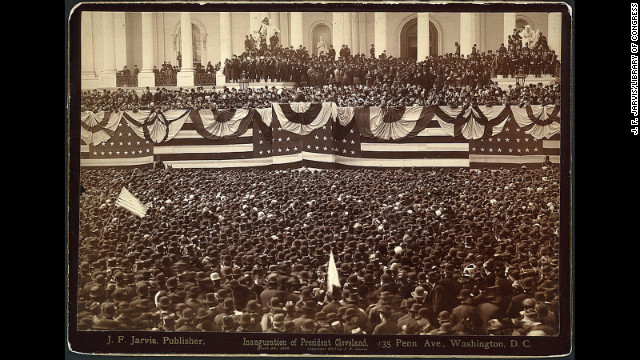 Grover Cleveland delivers his first inaugural address to the crowd on the east portico of U.S. Capitol on March 4, 1885.
Grover Cleveland delivers his first inaugural address to the crowd on the east portico of U.S. Capitol on March 4, 1885. 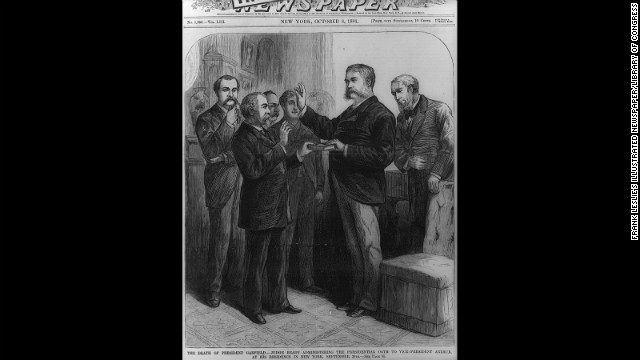 New York Supreme Court Justice John R. Brady administers the oath of office to Vice President Chester A. Arthur in a private ceremony in Arthur's residence in New York on September 20, 1881, after the assassination of President James A. Garfield.
New York Supreme Court Justice John R. Brady administers the oath of office to Vice President Chester A. Arthur in a private ceremony in Arthur's residence in New York on September 20, 1881, after the assassination of President James A. Garfield. 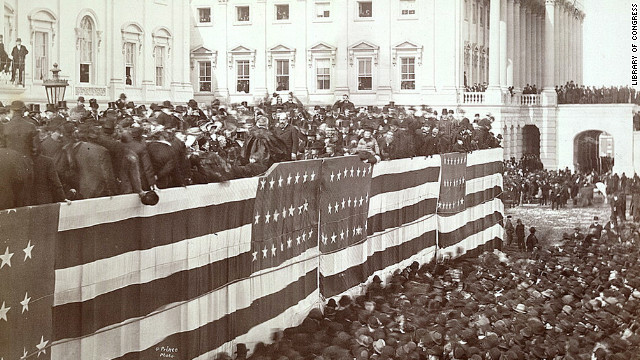 Chief Justice Morrison R. Waite administers the oath of office to James A. Garfield on the east portico of the U.S. Capitol on March 4, 1881.
Chief Justice Morrison R. Waite administers the oath of office to James A. Garfield on the east portico of the U.S. Capitol on March 4, 1881. 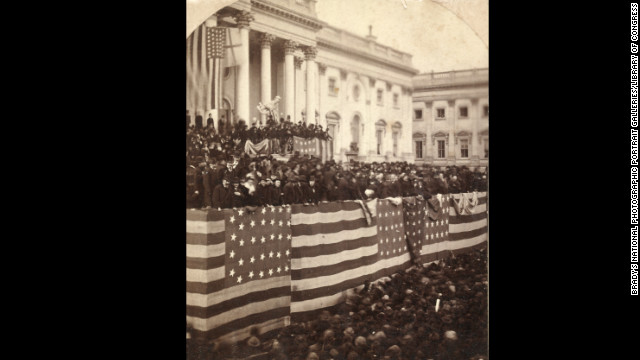 Rutherford B. Hayes takes the oath of office from Chief Justice Morrison R. Waite on the east portico of the U.S. Capitol on March 5, 1877.
Rutherford B. Hayes takes the oath of office from Chief Justice Morrison R. Waite on the east portico of the U.S. Capitol on March 5, 1877. 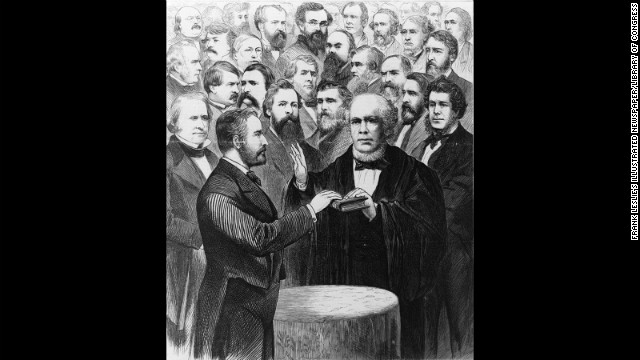 Chief Justice Salmon P. Chase administers the oath of office for Ulysses S. Grant's second term on March 4, 1873.
Chief Justice Salmon P. Chase administers the oath of office for Ulysses S. Grant's second term on March 4, 1873. 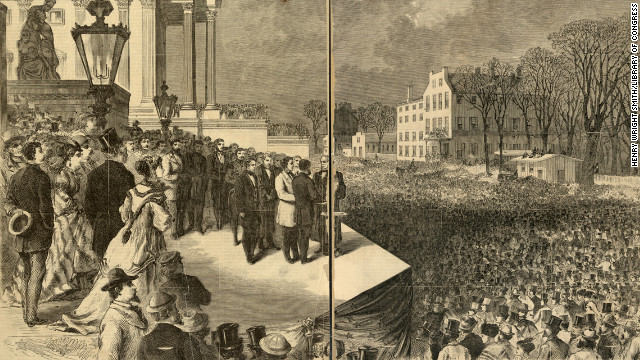 Ulysses S. Grant takes his first oath of office, administered by Chief Justice Salmon P. Chase, on the east portico of the U.S. Capitol in Washington on March 4, 1869.
Ulysses S. Grant takes his first oath of office, administered by Chief Justice Salmon P. Chase, on the east portico of the U.S. Capitol in Washington on March 4, 1869. 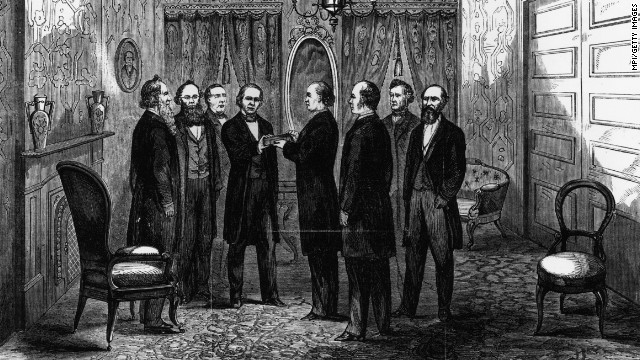 Andrew Johnson takes the oath of office from Chief Justice Salmon P. Chase in Washington on April 15, 1865, after the assassination of Abraham Lincoln.
Andrew Johnson takes the oath of office from Chief Justice Salmon P. Chase in Washington on April 15, 1865, after the assassination of Abraham Lincoln. 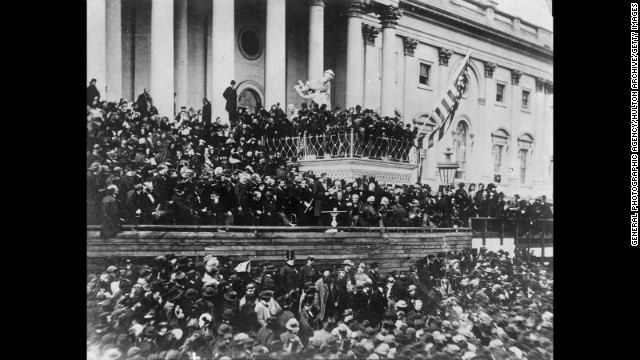 Abraham Lincoln take the oath of office for the second time on March 4, 1865.
Abraham Lincoln take the oath of office for the second time on March 4, 1865. 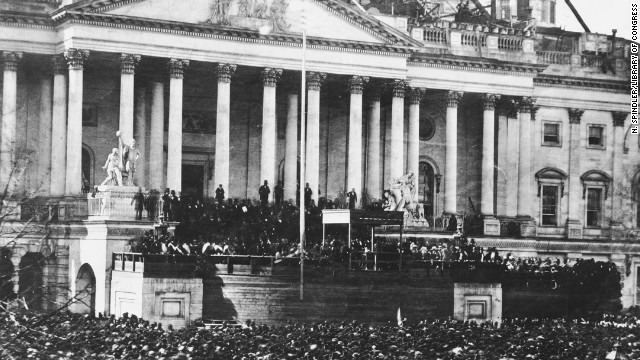 The first inauguration of Abraham Lincoln takes place on March 4, 1861.
The first inauguration of Abraham Lincoln takes place on March 4, 1861. 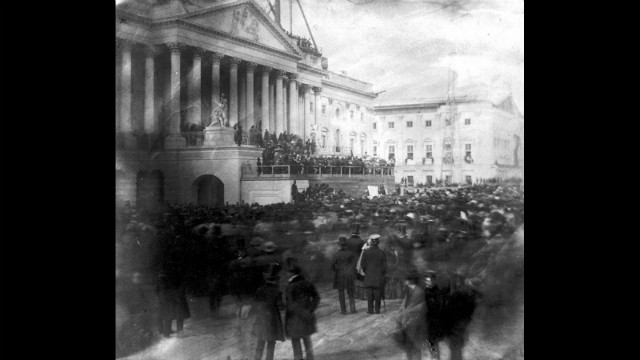 James Buchanan's inauguration is held at the U.S. Capitol on March 4, 1857.
James Buchanan's inauguration is held at the U.S. Capitol on March 4, 1857. 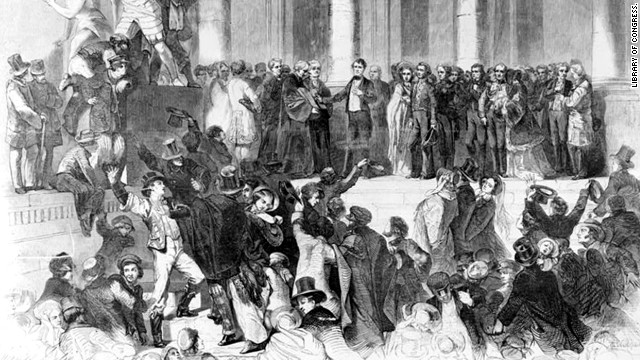 Chief Justice Roger B. Taney administers the oath of office to Franklin Pierce on the east portico of the U.S. Capitol on March 4, 1853.
Chief Justice Roger B. Taney administers the oath of office to Franklin Pierce on the east portico of the U.S. Capitol on March 4, 1853. 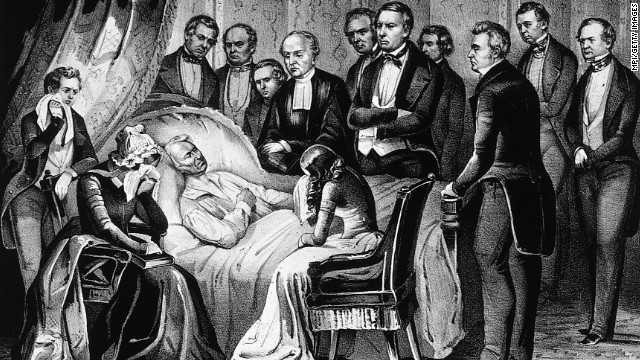 Millard Fillmore was sworn in on July 10, 1850, after the death of President Zachary Taylor.
Millard Fillmore was sworn in on July 10, 1850, after the death of President Zachary Taylor. 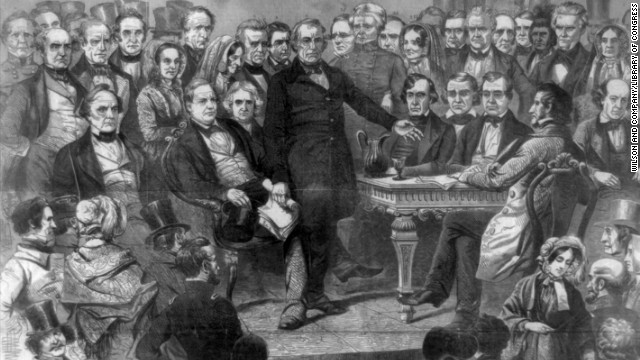 Zachary Taylor is sworn in on March 5, 1849.
Zachary Taylor is sworn in on March 5, 1849. 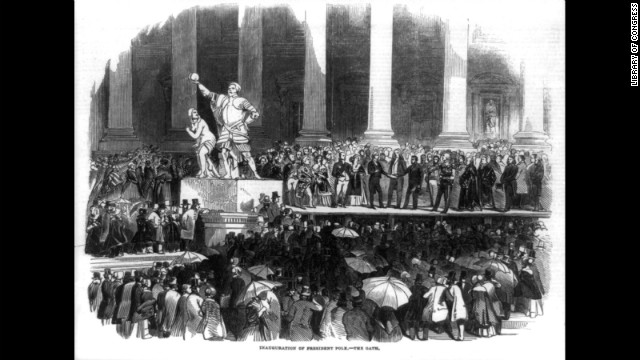 James K. Polk was sworn in on March 4, 1845.
James K. Polk was sworn in on March 4, 1845. 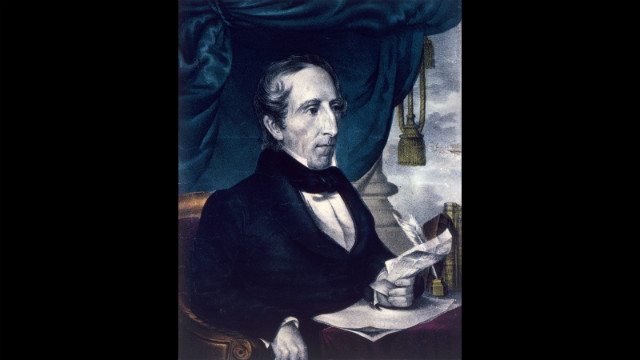 John Tyler took the oath of office on April 6, 1841, after the death of William Henry Harrison, who died after just 32 days in office.
John Tyler took the oath of office on April 6, 1841, after the death of William Henry Harrison, who died after just 32 days in office. 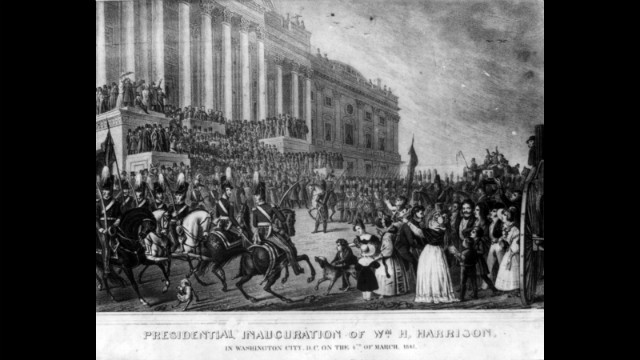 William Henry Harrison took the oath of office on March 4, 1841.
William Henry Harrison took the oath of office on March 4, 1841. 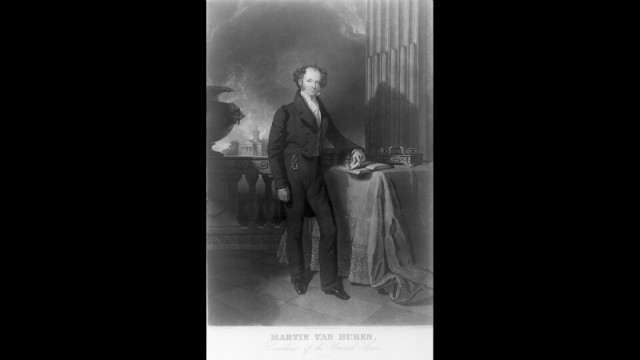 Martin Van Buren was inaugurated on March 4, 1837.
Martin Van Buren was inaugurated on March 4, 1837. 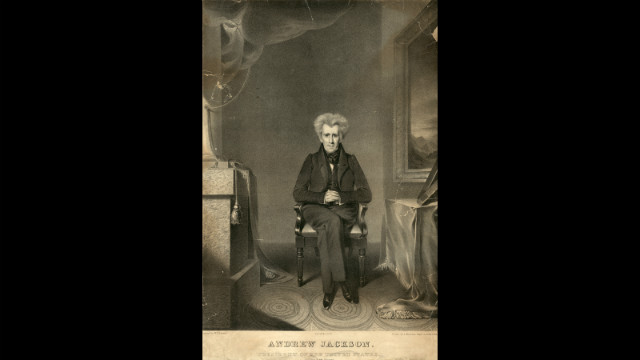 Andrew Jackson was sworn in for his second term on March 4, 1833.
Andrew Jackson was sworn in for his second term on March 4, 1833. 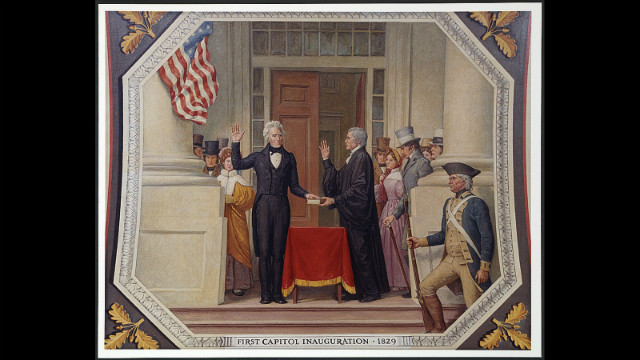 Andrew Jackson was inaugurated for his first term on March 4, 1829, on the east portico of the U.S. Capitol.
Andrew Jackson was inaugurated for his first term on March 4, 1829, on the east portico of the U.S. Capitol. 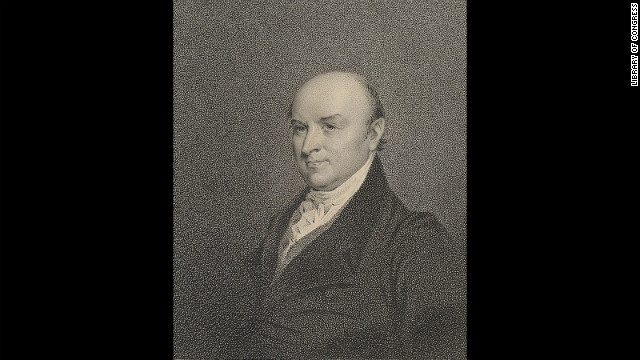 John Quincy Adams was sworn into office on March 4, 1825.
John Quincy Adams was sworn into office on March 4, 1825. 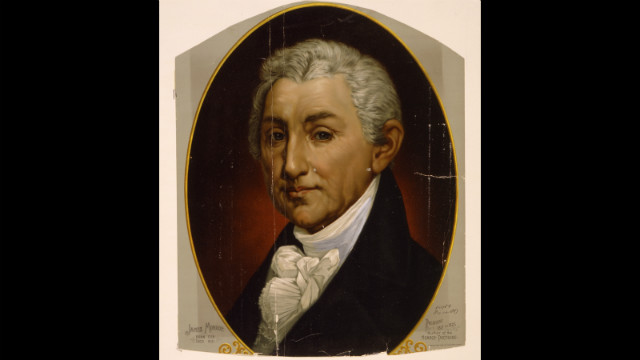 James Monroe was sworn in for his second term on March 4, 1821.
James Monroe was sworn in for his second term on March 4, 1821. 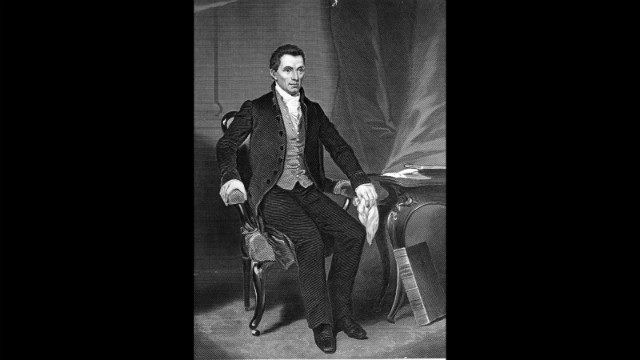 James Monroe was sworn in for his first term on March 4, 1817.
James Monroe was sworn in for his first term on March 4, 1817. 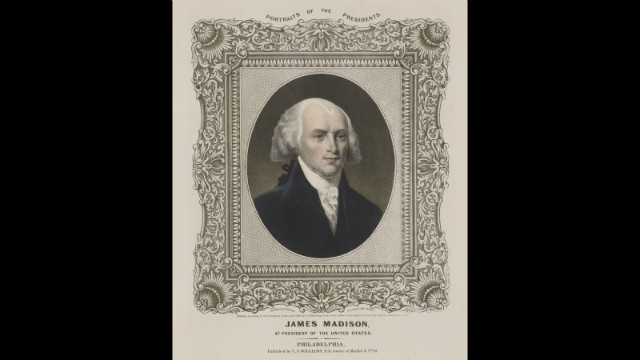 James Madison was inaugurated for his second term on March 4, 1813.
James Madison was inaugurated for his second term on March 4, 1813. 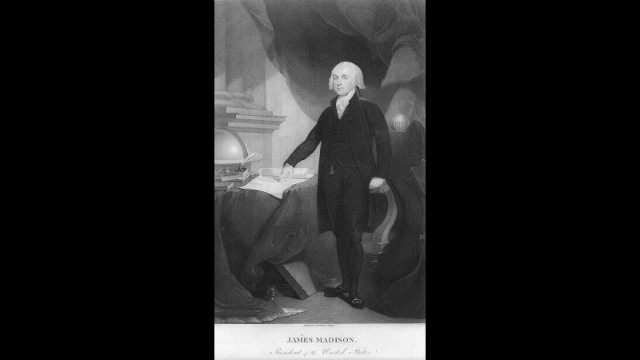 James Madison was sworn in for his first term on March 4, 1809.
James Madison was sworn in for his first term on March 4, 1809. 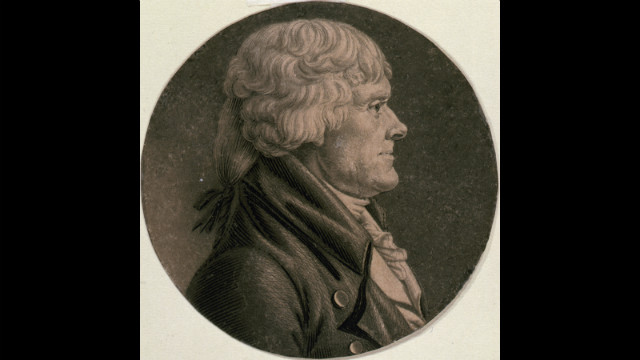 Thomas Jefferson was sworn in for his second term on March 4, 1805.
Thomas Jefferson was sworn in for his second term on March 4, 1805. 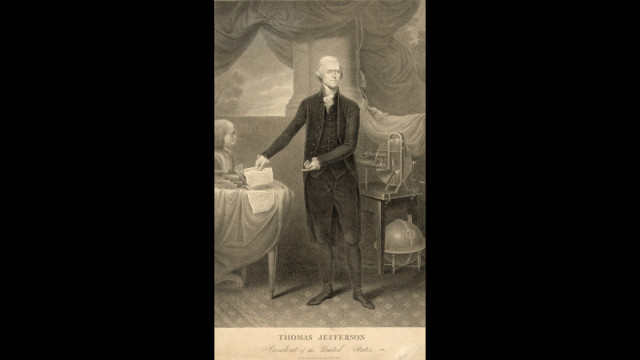 Thomas Jefferson was inaugurated for his first term on March 4, 1801.
Thomas Jefferson was inaugurated for his first term on March 4, 1801. 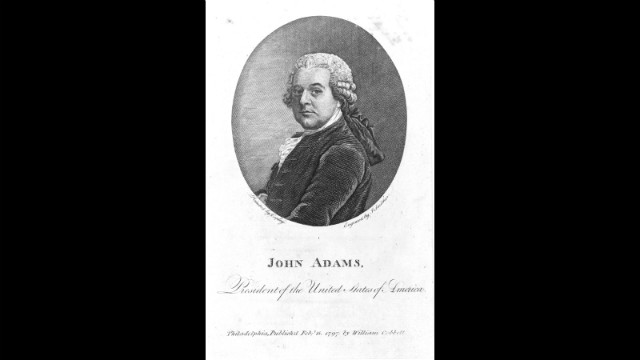 John Adams was inaugurated on March 4, 1797.
John Adams was inaugurated on March 4, 1797. 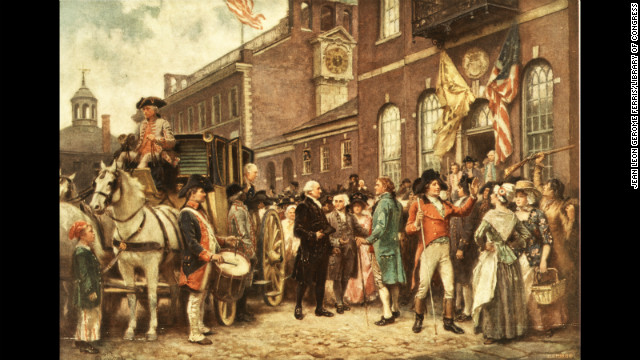 George Washington stands outside his carriage at his second inauguration on March 4, 1793.
George Washington stands outside his carriage at his second inauguration on March 4, 1793. 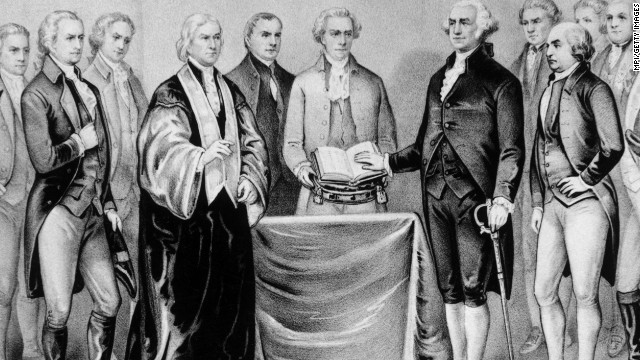 Sword by his side, George Washington takes his inaugural oath as the first president of the United States on April 30, 1789. Presidential inaugurations and oaths Presidential inaugurations and oaths Presidential inaugurations and oaths Presidential inaugurations and oaths Presidential inaugurations and oaths Presidential inaugurations and oaths Presidential inaugurations and oaths Presidential inaugurations and oaths Presidential inaugurations and oaths Presidential inaugurations and oaths Presidential inaugurations and oaths Presidential inaugurations and oaths Presidential inaugurations and oaths Presidential inaugurations and oaths Presidential inaugurations and oaths Presidential inaugurations and oaths Presidential inaugurations and oaths Presidential inaugurations and oaths Presidential inaugurations and oaths Presidential inaugurations and oaths Presidential inaugurations and oaths Presidential inaugurations and oaths Presidential inaugurations and oaths Presidential inaugurations and oaths Presidential inaugurations and oaths Presidential inaugurations and oaths Presidential inaugurations and oaths Presidential inaugurations and oaths Presidential inaugurations and oaths Presidential inaugurations and oaths Presidential inaugurations and oaths Presidential inaugurations and oaths Presidential inaugurations and oaths Presidential inaugurations and oaths Presidential inaugurations and oaths Presidential inaugurations and oaths Presidential inaugurations and oaths Presidential inaugurations and oaths Presidential inaugurations and oaths Presidential inaugurations and oaths Presidential inaugurations and oaths Presidential inaugurations and oaths Presidential inaugurations and oaths Presidential inaugurations and oaths Presidential inaugurations and oaths Presidential inaugurations and oaths Presidential inaugurations and oaths Presidential inaugurations and oaths Presidential inaugurations and oaths Presidential inaugurations and oaths Presidential inaugurations and oaths Presidential inaugurations and oaths Presidential inaugurations and oaths Presidential inaugurations and oaths Presidential inaugurations and oaths Presidential inaugurations and oaths Presidential inaugurations and oaths Presidential inaugurations and oaths Presidential inaugurations and oaths Presidential inaugurations and oaths Presidential inaugurations and oaths Presidential inaugurations and oaths Presidential inaugurations and oaths Presidential inaugurations and oaths Presidential inaugurations and oaths HIDE CAPTION << <
Sword by his side, George Washington takes his inaugural oath as the first president of the United States on April 30, 1789. Presidential inaugurations and oaths Presidential inaugurations and oaths Presidential inaugurations and oaths Presidential inaugurations and oaths Presidential inaugurations and oaths Presidential inaugurations and oaths Presidential inaugurations and oaths Presidential inaugurations and oaths Presidential inaugurations and oaths Presidential inaugurations and oaths Presidential inaugurations and oaths Presidential inaugurations and oaths Presidential inaugurations and oaths Presidential inaugurations and oaths Presidential inaugurations and oaths Presidential inaugurations and oaths Presidential inaugurations and oaths Presidential inaugurations and oaths Presidential inaugurations and oaths Presidential inaugurations and oaths Presidential inaugurations and oaths Presidential inaugurations and oaths Presidential inaugurations and oaths Presidential inaugurations and oaths Presidential inaugurations and oaths Presidential inaugurations and oaths Presidential inaugurations and oaths Presidential inaugurations and oaths Presidential inaugurations and oaths Presidential inaugurations and oaths Presidential inaugurations and oaths Presidential inaugurations and oaths Presidential inaugurations and oaths Presidential inaugurations and oaths Presidential inaugurations and oaths Presidential inaugurations and oaths Presidential inaugurations and oaths Presidential inaugurations and oaths Presidential inaugurations and oaths Presidential inaugurations and oaths Presidential inaugurations and oaths Presidential inaugurations and oaths Presidential inaugurations and oaths Presidential inaugurations and oaths Presidential inaugurations and oaths Presidential inaugurations and oaths Presidential inaugurations and oaths Presidential inaugurations and oaths Presidential inaugurations and oaths Presidential inaugurations and oaths Presidential inaugurations and oaths Presidential inaugurations and oaths Presidential inaugurations and oaths Presidential inaugurations and oaths Presidential inaugurations and oaths Presidential inaugurations and oaths Presidential inaugurations and oaths Presidential inaugurations and oaths Presidential inaugurations and oaths Presidential inaugurations and oaths Presidential inaugurations and oaths Presidential inaugurations and oaths Presidential inaugurations and oaths Presidential inaugurations and oaths Presidential inaugurations and oaths HIDE CAPTION << <
{ 0 comments... read them below or add one }
Post a Comment